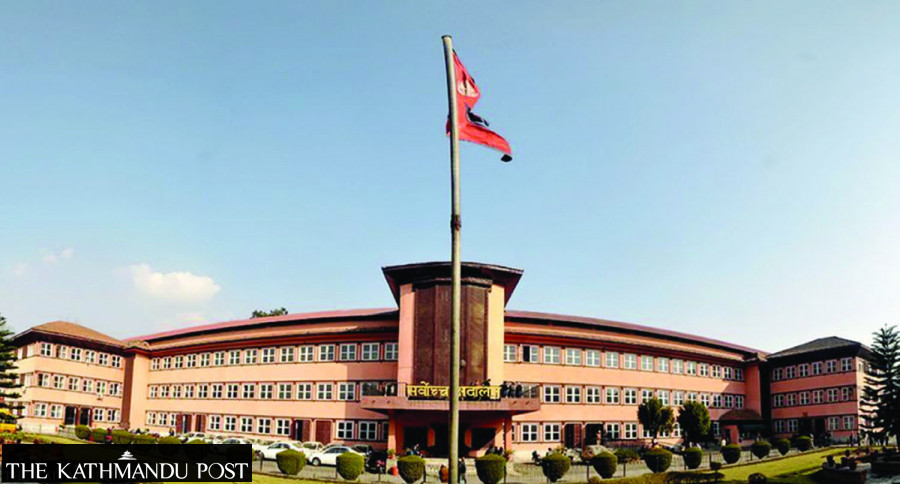National
Court rules pardon in criminal cases under political cover illegal
The ruling would be considered while passing verdicts in petitions challenging presidential pardons, say experts.
Binod Ghimire
The Supreme Court has ruled that granting pardon in a criminal case under political cover is unconstitutional and goes against the principle of law and justice.
Releasing a full text of its verdict to uphold the lower court’s conviction against Resham Lal Chaudhary, a former lawmaker, in connection with the August 2015 Tikapur incident that saw seven police personnel and a toddler killed, the court ruled against the practice of withdrawing criminal cases as a tool of political bargain.
“It would be miscarriage of justice to obstruct the investigation of criminal cases by giving them political cover,” the court order said in the full text of the verdict made public on Wednesday. “Granting pardon in such cases is unconstitutional and against the rule of law and principle of justice.”
The Supreme Court on May 16 had upheld the decisions of lower courts to convict Chaudhary with life-sentence for masterminding the Tikapur carnage.
Rejecting Chaudhary’s plea for a clean chit, a division bench of justices Ananda Mohan Bhattarai and Nahakul Sudedi had concluded that he should face life imprisonment. Chaudhary, along with 10 others—who were convicted by the Kailali District Court on March 6, 2019 and by the Dipayal High Court on December 18, 2020—had moved the Supreme Court.
Ten days after the verdict, President Ramchandra Paudel, on the government’s recommendation, commuted his remaining jail term. Chaudhary had, on May 25, appealed to the President’s Office, through the Ministry of Home Affairs, to commute his jail term. The office returned the application to the ministry, for action. Accordingly, the government made the recommendation on May 28.
“This is a precedent-setting verdict that will stop the misuse of authority by successive governments in granting pardons for criminal offences,” Prakash Osti, a former Supreme Court justice, told the Post. “This verdict will not affect the decision to pardon Resham Chaudhary. However, the ruling would be taken into consideration while passing a verdict in a petition challenging the presidential pardon.”
Sharada Kadayat Bohara, wife of police inspector Keshav Bohara, who was killed in the Tikapur incident, has challenged the government decision to pardon Chaudhary in the top court. The court has issued a show cause notice to the government, but the final hearing on the matter is yet to start.
Article 276 of the Constitution of Nepal says the President may, in accordance with law, grant pardons; suspend, commute or remit any sentence passed by any court, judicial or quasi-judicial institution or administrative authority or institution.
The Supreme Court will interpret the provision while deciding Kadayat’s plea.
Human rights lawyers say the verdict will have far-reaching consequences. Raju Prasad Chapagain, an advocate, said it will affect the government’s ongoing move to pass a law to grant amnesty/pardon in cases of political nature.
A bill to amend some Nepal Acts, which is in Parliament, has a provision that says cases sub judice in any court against anyone from a party or a group which conducted violent protests in the past, but is carrying out its activities peacefully now based on the constitution and the law, can be withdrawn. Through the bill, the government has added a sub-section to section 116 of the Criminal Procedure Code, which ultimately aims to withdraw the cases from all tiers of courts—the Supreme Court, High Courts and the District courts—against the political leaders.
“Even if the bill is endorsed by the federal parliament, it can be challenged before the court and possibly be scrapped,” Chapagain told the Post.
In the verdict, the division bench said the claim from the defendant’s lawyers that there should be no prosecution in cases of political nature cannot be agreed upon. It has, after studying the role of Resham Chaudhary, asserted that it was he who had organised the protest and was himself involved in attacking the police officials.
Pradip Chaudhary, Hari Nayaran Chaudhary and Karan Chaudhary, who are also accused in the Tikapur incident had recorded their statements with the police, saying that Resham had a direct involvement in attacking security officials. Though Pradip and Hari Narayan changed their statements in Kailali District Court, Karan’s statement was consistent with the one he gave to the police, according to the bench.
The court took their statements as well as from Deepak Raj Thapa, an injured in the incident, police personnel Khagendra Bahadur Saud and Rajesh Thapa, in addition to considering other circumstantial evidence to convict Chaudhary.
The Tikapur incident happened on August 24, 2015 during a protest organised by the Tharu community against a government decision to lump Kailali with seven hill districts in a single province. The Tharu community had been protesting for months in the run-up to the promulgation of the constitution, demanding a separate Tharuhat province comprising several historically Tharu-dominated districts.
On that day, the Tharuhat group had asked its supporters to come out in protest by defying the prohibitory orders of the local administration. Violent clashes between protesters and police resulted in eight deaths.
The police, on September 15, 2015, filed murder charges against Chaudhary and others who were absconding after the violent incident. Chaudhary, in February 2021, had surrendered before the Kailali court.




 13.12°C Kathmandu
13.12°C Kathmandu














